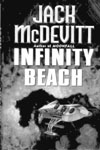 Infinity
Beach
Infinity
Beach
by Jack McDevitt
A book review by Mark L. Olson
HarperPrism, 2000, 435 pp, $25.00
Jack McDevitt seems to be an unreliable writer - some of his work is very good, while others pieces miss the mark. (I think particularly of Ancient Shores which started out superbly, but wound down into a silly ending.) This is one of the better ones.
The story is set a thousand or so years hence. An interstellar drive exists and there are thriving colonies on eight extra-solar planets. But Man appears to be alone in the universe - after centuries of exploration, no life more complicated than prokaryotic bacteria has been discovered off Earth.
This fact has a terrible effect on Humanity, and people are in some ways just giving up. Exploration has been curtailed, though it's not yet dead, and populations are shrinking on some of the colony planets. Greenway, on which the story is mostly set, is a prosperous world, now fully terraformed, but even Greenway is stagnating.
Kimberly Brandywine an astrophysicist-turned-fundraiser works for the only organization on Greenway which still searches for aliens. She's good at fundraising and feels she's making a major contribution to SETI even if she's no longer doing science herself.
Her comfortable life is upset when she begins to search for the truth about why her 10-year-older clone Emily disappeared many years before. The trail is long cold, but appears to be connected to persistent rumors of a ghost inhabiting an abandoned house is a wilderness area. The search is long and convoluted and takes her outside the law and into space and, ultimately, leads her to discover the long-sought alien civilization which is needed to revitalize Humanity.
The book is well done and the characters believable. The scenes with the ghostly presence were very well done - they were scary - and the love interest was handled well, also. I thought the idea that being alone in the cosmos would sap Man's vitality is a first-rate idea and well-handled.
I greatly enjoyed Infinity Beach and nominated it for the Hugo. But I have some quibbles:
My big gripe is that Greenway and its civilization was far too much like late 20th century America with a few new gadgets. I can't believe that society would have changed so little. McDevitt tried to build a sense of history with a few nice touches like a monument to a revolution on Greenway which happened a couple of centuries before the time of the story, but generally he just didn't come close. There was no sense of this being a distant planet in the far future. It felt a lot like Oregon.
A secondary gripe is that the idea of setting off supernovae to signal aliens is ridiculous. Kim's Institute's largest project is to set off a regularly-timed string of supernovae to create a signal visible to aliens even in another Galaxy.
What's wrong with that? To start with, there is no other indication that human technology is up to the job -- McDevitt must picture stars as being a few miles across if he thinks that the humans civilization he's described could manipulate them on that scale. Secondly, the idea that setting a supernova off every 60 days would be an obvious signal neglects light-speed. Since the stars themselves are light-years apart, there is no way they could be exploded so that they appeared to explode on a regular schedule except in one favored direction in space. In most directions, they'd appear to explode years apart. Silly. Finally, even ignoring that, since the space for hundreds of light-years right around the supernovae had been well-explored there was no chance of the project paying off in less than thousands of years (light only travels at the speed of light, right?), and millions of years off is more likely. Why bother?
Finally, the aliens were a bit ludicrous, but this wasn't terrible -- an author is allowed one absurd element, and it worked pretty well.
Withal, recommended.
See also my review of McDevitt's books: Infinity Beach, Deepsix, Chindi
NESFA homepage | Review Index | More Reviews by Mark L. Olson
